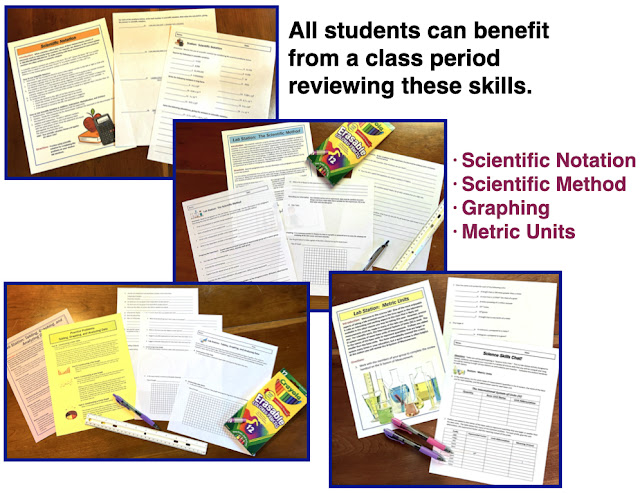Do your students ask you questions like these?
- Which one of these things is the graduated cylinder?
- How do I convert from decimeters to decameters?
- I can't do scientific notation on my calculator.
- What are independent and dependent variables and how do I put them on a graph?
- You wanted the graph to be on graph paper?
- I did measure exactly 5 grams of salt on my balance! ( ... with salt in a beaker that wasn't massed.)
- What do I do next?
Sound familiar? If you teach middle or high school science, these are probably questions you’ve heard a thousand times. And if you’re anything like me, you're always looking for ways to build essential science skills early in the year—so your students are more confident, independent, and lab-ready.
That’s exactly why I created these 17 Essential Science Skills Stations—hands-on, low-prep, and perfect for reinforcing key science lab skills across biology, chemistry, physical science, or general science classes.
🧪 “I used these during the first two weeks of school, and my students were so much more confident during our first full lab! Total game-changer.” – Melissa B., HS Biology Teacher
What are the essential science skills?
In the first days and weeks of a new school year, I need my students to be proficient in the following:
- Metric measurement
- Identification of pieces of lab equipment
- Scientific method
- Use of basic pieces of lab equipment such as the graduated cylinder, Celsius thermometer, laboratory balance, and metric ruler.
- Tabling, graphing, and analyzing data.
- Math skills: Scientific notation, dimensional analysis, significant digits
To accomplish this goal of proficiency of science skills, I have developed Science Skills Chat! -- a set of 17 Lab Stations to address 17 essential science skills all science students should know. I use the word "chat" to emphasize to my students that they are to work together and have a productive discussion at each station in order to maximize their understanding and mastery of the concepts being covered.
Peer tutoring is a powerful learning tool!
 |
| Click on red text or any image to view Science Skills Chat in my TpT store. |
What are the 17 Essential Science Skills?
- Metric Units
- Identification of Lab Equipment
- Scientific Notation
- Dimensional Analysis
- Significant Digits
- The Scientific Method
- Tabling, Graphing, and Analyzing Data
- The Graduated Cylinder
- The Metric Ruler
- The Laboratory Balance
- The Celsius Thermometer
- The Bunsen Burner
- Determining the Volume of Solids
- Separating a Mixture
- Determining Density
- Accuracy, Precision, and Percentage Error
- Scientific Drawings
Don't try to complete all 17 lab stations at once. Choose a set of skills (perhaps 4 or 5 lab stations) to be completed during the first week of school. Choose the skills that are of immediate concern to you. Remember, some students may already be proficient in these skills, but other students will be struggling. No matter the ability level, ALL students will benefit from this review and reinforcement.
 |
| Click on red text or any image to view Science Skills Chat in my TpT store. |
Once your students have mastered the first set of skills that you deem most important, set up another lab station day to work on skills that students will soon need to know.
I like the idea of having "Science Skills Friday" where you choose 4 or 5 lab stations to complete. The information in a fewer number of lab stations is not overwhelming, and it is a fun and different way to end the week. There are enough lab stations in Science Skills Chat to create several "Science Skills Friday" sessions.
 |
| Click on red text or any image to view Science Skills Chat in my TpT store. |
Ten of the lab stations require some sort of lab equipment, but the other 7 skills are perfect activities to leave in your substitute teacher folder. In an emergency, your sub can grab a few of these and create a VERY quality lesson in your absence.
It may seem like you are spending a lot of time at the beginning of the year to cover these 17 science skills, but I guarantee that it is time well spent. As your school year progresses, you will spend far less time repeating and re-teaching skills that your students should already know.
And, how nice would it be to reduce the number of questions you get every time you go to the lab?
P.S. I have 11 Chat Lab Station Activities on a variety of topics. You can view them all here:




No comments:
Post a Comment